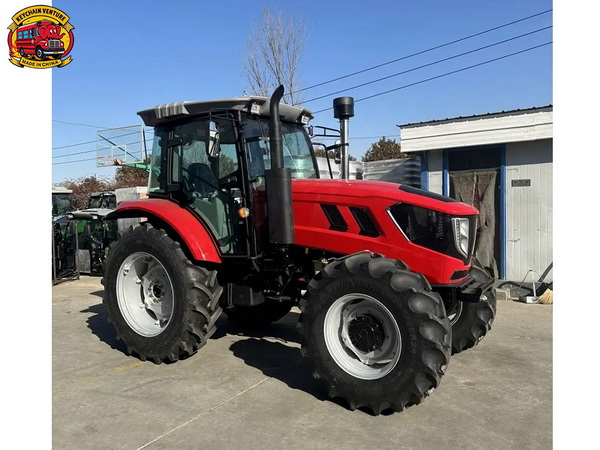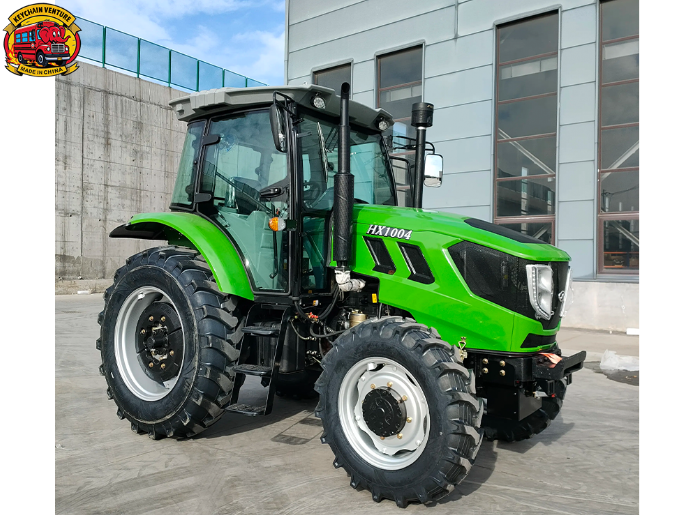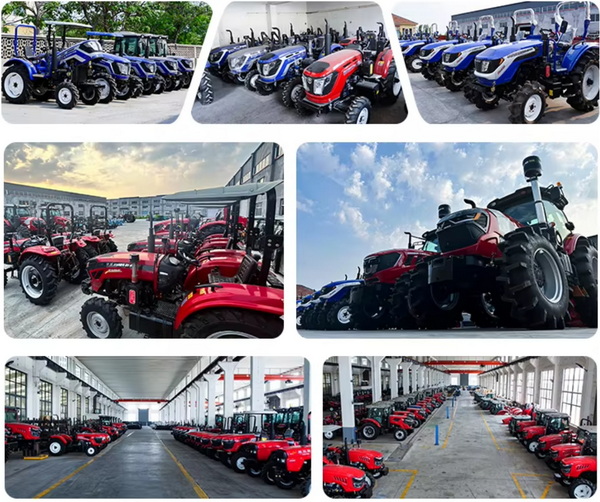Views: 222 Author: Amanda Publish Time: 2025-09-06 Origin: Site








Content Menu
● Why Choose Used Tractor Tires?
● Key Considerations When Buying Used Tractor Tires
>> Tire Age
● Where to Buy Used Tractor Tires?
>> 1. Specialized Tractor Tire Retailers
>> 3. Agricultural Equipment Dealers and Auctions
>> 4. Local Farm Supply Stores and Tire Shops
>> 5. Tractor Repair and Service Centers
● How to Inspect Used Tractor Tires Before Buying
>> Bead Area
>> General Storage and Handling Signs
● Popular Types of Used Tractor Tires and Their Uses
● Maintenance Tips for Extending the Life of Used Tractor Tires
● Benefits of Quality Used Tractor Tires for Your Business
>> 1. Lower Capital Expenditure
>> 4. Flexibility in Tire Upgrades
>> 5. Accessibility and Convenience
● FAQs
>> 1. How can I tell if a used tractor tire is still good?
>> 2. Are used tractor tires safe for heavy-duty farm work?
>> 3. Can I return used tractor tires if they are defective?
>> 4. How long do used tractor tires typically last?
>> 5. What are the best types of used tractor tires for wet terrain?
When it comes to maintaining a tractor, one of the most critical components that ensures smooth operation is the tire. Whether you're a farmer, a contractor, or a commercial vehicle operator, having reliable tractor tires is essential for performance and safety. However, new tractor tires can be costly, especially for high-performance or heavy-duty models. This is why many turn to used tractor tires as a cost-effective and environmentally friendly alternative.
In this comprehensive guide, we will explore the best places to buy used tractor tires, factors to consider, how to inspect and select quality tires, and the benefits of choosing used tractor tires. As a leading commercial vehicle supplier, KeyChain Venture Co., Ltd. understands the importance of quality tires and customer satisfaction. Let's dive into where you can source the best used tractor tires while ensuring you get value for your money.

Before delving into where to buy used tractor tires, it's important to understand why they might be the right choice for you.
- Cost Savings: Used tractor tires typically cost 30-70% less than new tires, reducing your overall operational expenses.
- Availability: Sometimes, specific tractor tire models or sizes may be difficult to find new, but available as used stock.
- Environmental Impact: Reusing tires helps reduce waste and supports sustainability efforts.
- Short-Term Use: For tractors used on a seasonal basis or infrequently, used tires can offer good performance without heavy investment.
Many farms and businesses find that buying used tires allows them to allocate more funds toward other essential tractor maintenance or upgrades, making their overall agricultural operations more efficient.
Inspect the tread depth carefully and look for signs of damage such as cracks, splits, uneven wear, or patches. Tires showing uneven wear may indicate alignment problems or improper usage, which could shorten the lifespan of the tire or cause inconsistent performance in the field.
Tractor tires come in various sizes and types depending on the tractor's make, model, and intended use. Always verify the size by checking the tire's sidewall markings, ensuring they match the manufacturer's recommendations. Buying an incorrect size can cause handling difficulties and excessive wear or damage.
Even if a tire looks good aesthetically, the rubber can degrade over time due to exposure to UV rays and environmental conditions. The manufacturing date can be found via a DOT code—a four-digit number indicating the week and year of production. It's best to avoid tires older than 6 years unless you can confirm they were stored properly and show minimal wear.
Purchasing from reputable dealers or companies ensures better quality control, a more transparent history of the tire, and often offers return policies or limited warranties. Buying from unknown or private sellers can be cheaper but riskier.

Many businesses exclusively focus on tractor tires and offer a wide range of new and used options. These retailers often inspect and sometimes recondition their used tires, providing more reliable products.
Advantages:
- Wide selection of tire brands and sizes
- Expert advice on tire compatibility
- Possible warranty and after-sales support
Considerations:
- Prices may be higher than direct or private sales due to inspection and reconditioning costs
Numerous online agricultural equipment platforms, tire-specific marketplaces, and general sales websites list used tractor tires for sale. These platforms allow buyers to compare prices and models from different regions quickly.
Advantages:
- Broad variety of tires available year-round
- Ability to search by size, brand, price, and condition
- Convenient for buyers located far from rural areas where tires are sold physically
Considerations:
- Lack of physical inspection prior to purchase
- Risk of receiving tires that do not meet expectations or are misrepresented
- Shipping costs and times should be factored in
Tractor dealerships and farm equipment auctions are good sources of used tires, often removed from trade-in vehicles or included in equipment lots.
Advantages:
- Tires come from functioning machinery with known usage histories
- Potential to purchase tires at lower prices, especially at auctions
Considerations:
- Limited and irregular selection—only what is available at the time
- Auctions require buyer presence or bidding agents
Some farm supply stores and local tire shops maintain used tractor tire inventory or have arrangements with suppliers.
Advantages:
- Opportunity for in-person inspection before purchase
- Immediate availability for emergencies
- Personal customer support
Considerations:
- Stock may be limited in variety or size
- Prices might be slightly higher compared to online options
Centers specializing in tractor repair often take off used tires during maintenance and resell them.
Advantages:
- Sellers knowledgeable about product condition
- Potential access to tires with detailed equipment history
Considerations:
- Availability depends on service center inventory turnover
- May require persistence to find suitable tires

Before committing to buy, it's essential to conduct a thorough inspection of any used tractor tire. If possible, perform a physical inspection. Otherwise, request detailed images or videos focusing on key tire areas.
- Ensure the tread is thick enough and not worn excessively.
- Deep, uniform lugs provide better traction and last longer.
- Avoid tires with bald spots or worn-down center regions.
- Carefully check for cracks, bulges, splits, or signs of repaired damage.
- Sidewalls endure significant stress and compromise can lead to tire failure.
- Confirm that no patches or plugs were done in structurally sensitive areas.
- This is where the tire seals against the rim—damaged beads can cause air leaks.
- Look for deformities, corrosion, or cuts.
- Uneven wear can indicate misalignment or overloading during previous use.
- Uneven tires might wear out faster and reduce helicopter control.
- Identify the manufacturing week and year on the sidewall.
- Prioritize tires made within the last 6 years.
- Consider storing older tires with caution or choosing recent stock.
- Tires stored lying flat under shaded, cool conditions usually maintain integrity better.
- Tires exposed to sun or outdoor elements often degrade faster.

Different types of tractor tires suit different farming or terrain conditions. Knowing this helps you select used tires matching your operational needs.
- R1 Agricultural Tires: Known as "ag" tires, feature deep, wide lugs for maximum traction in plowing, tilling, and other fieldwork.
- R1W Wet Field Tires: Similar to R1 but with deeper and wider lugs designed for soft and wet soils to improve grip.
- R2 Turf Tires: Feature shallower tread patterns designed to minimize turf damage when working on lawns or golf courses.
- R3 Industrial Tires: Rounded lugs suitable for construction sites, hard surfaces, and mixed terrains.
- R4 Industrial/Agricultural Tires: Versatile tires combining good traction with turf friendliness, used on loaders and multipurpose machinery.
Choosing the right tire type helps optimize tractor performance and prolong tire life.
After purchasing used tractor tires, proper care can maximize their lifespan and safety:
- Regular Pressure Checks: Keep tires inflated to the manufacturer's recommended pressure. Over or under-inflation accelerates wear.
- Balanced Loading: Distribute tractor weight evenly and avoid overloading tires to prevent premature fatigue.
- Periodic Rotation: Rotating tires helps ensure even tread wear across all tires.
- Clean Tires After Use: Remove mud, stones, and debris that may cause damage or accelerate wear.
- Safe Storage: When not in use for extended periods, store tires in cool, dry, and shaded areas away from direct sunlight and heat.
- Avoid Sharp Turns and Abrupt Stops: These actions can cause unnecessary strain and tearing on tires.
Implementing these steps will ensure your investment in used tractor tires delivers reliable service through many seasons.
Choosing quality used tractor tires can boost your operational efficiency and financial health.
Investing in used tires saves upfront costs, allowing funds for other equipment or maintenance needs. This flexibility is crucial for small to mid-sized farms balancing multiple budget priorities.
Properly inspected and matched used tires can perform comparably to new tires, particularly for routine fieldwork and general farm duties.
Reusing tires extends their life cycle and reduces landfill waste and raw material consumption, promoting more sustainable farming practices.
Used tires enable you to try different tire types or brands without committing to the price of new tires. This experimentation can lead to better traction or durability suited to your specific needs.
Purchasing used tires is often quicker and doesn't require months of waiting for new stock, especially during peak farming seasons when service demands are high.
Finding the right used tractor tires requires research, inspection, and trust in your supplier. Whether you're purchasing from specialized retailers, online platforms, auctions, or local shops, focusing on tire condition, compatibility, and seller reliability will guarantee a good investment. Used tractor tires provide a cost-effective, sustainable, and practical option for many tractor owners, allowing you to maintain your machine's performance without breaking the bank.
At KeyChain Venture Co., Ltd., we are committed to helping you find top-quality tractor and heavy-duty vehicle solutions. With the right used tractor tires, you can improve your tractor's efficiency and extend its life, supporting your hardworking operations in China and beyond.

Inspect tread depth for sufficient thickness, check sidewalls for any cracks or bulges, and verify the manufacturing date to ensure the tire isn't too old. A well-maintained tire typically has at least 50% of tread remaining and no visible damage.
Yes, as long as the tires have been properly inspected and are suited for the intended load and terrain. Avoid used tires with structural damage or excessive wear for demanding applications.
Return policies vary by seller. Reputable dealers often provide warranties or return windows, but private sales typically do not offer returns. Always clarify return or warranty details before purchasing.
Depending on previous usage, wear, and maintenance, used tires can last several seasons to years. However, their lifespan will generally be shorter than new tires, so ongoing care is important.
R1W Wet Field tires are designed with deeper lugs to improve traction and performance in muddy and wet soil conditions commonly found in wet terrains.
Field Visit To DR Congo – Products in Action, Friendships in Progress
Treat Your Team to the Perfect Ending: A Cultural Day & Rejuvenating Massage
Just received this absolutely gorgeous bouquet specially ordered by our lovely customer!
Truly inspiring conversations today with our highly insightful client!
Today, we visited the bus company together with our client. It was really wonderful!
A Milestone Moment: Custom Buses Successfully Shipped, Setting Course for New Horizons
Forging Stronger Ties: Welcoming Key African Partners to Chongqing for Transport Collaboration